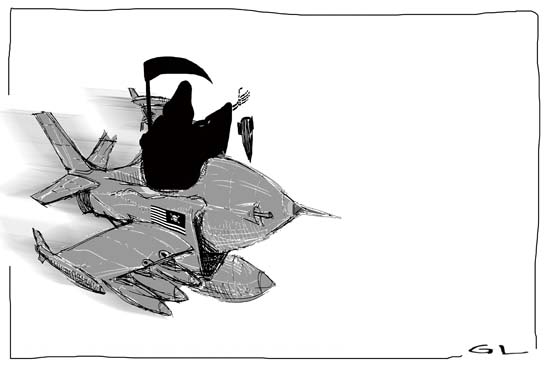Search
Recent comments
- peer pressure....
10 hours 55 min ago - strike back....
11 hours 1 min ago - israel paid....
12 hours 3 min ago - on earth....
16 hours 33 min ago - distraction....
17 hours 43 min ago - on the brink....
17 hours 53 min ago - witkoff BS....
19 hours 7 min ago - new dump....
1 day 7 hours ago - incoming disaster....
1 day 7 hours ago - olympolitics.....
1 day 7 hours ago
Democracy Links
Member's Off-site Blogs
have a pleasant flight...

Take a recent event on a distant hillside in Afghanistan’s Kunar Province where 10 boys, including two sets of brothers, were collecting wood for their families on a winter’s day when the predators -- this time American helicopters evidently looking for insurgents who had rocketed a nearby American base -- arrived. Only one of the boys survived (with wounds) and he evidently described the experience as one of being “hunted” -- as the Predator hunts humans or human hunters stalk animals. They “hovered over us,” he said, “scanned us, and we saw a green flash,” then the helicopters rose and began firing.
For this particular nightmare, war commander General David Petraeus apologized directly to Afghan President Hamid Karzai, who has for years fruitlessly denounced U.S. and NATO air operations that have killed Afghan civilians. When an angered Karzai refused to accept his apology, Secretary of Defense Gates, on a surprise visit to the country, apologized as well, as did President Obama. And that was that -- for the Americans.
....
So count on this: there will be no more Top Guns. No knights of the air. No dogfights and sky-jousts. No valor. Just one-sided slaughter and targeted assassinations. That is where air power has ended up. Live with it.
http://www.tomdispatch.com/post/175368/tomgram%3A_engelhardt%2C_top_guns_no_more/#more
- By Gus Leonisky at 22 Mar 2011 - 5:57pm
- Gus Leonisky's blog
- Login or register to post comments
happy anniversary...
The world’s first aerial bombing mission took place 100 years ago, over Libya. It was an attack on Turkish positions in Tripoli. On 1 November 1911, Lieutenant Cavotti of the Italian Air Fleet dropped four two-kilogramme bombs, by hand, over the side of his aeroplane. In the days that followed, several more attacks took place on nearby Arab bases. Some of them, inaugurating a pattern all too familiar in the century since then, fell on a field hospital, at Ain Zara, provoking heated argument in the international press about the ethics of dropping bombs from the air, and what is now known as ‘collateral damage’. (In those days it was called ‘frightfulness’.) The Italians, however, were much cheered by the ‘wonderful moral effect’ of bombing, its capacity to demoralise and panic those on the receiving end.
A hundred years on, as missiles rain down on Gaddafi’s defences and sleeping Libyan soldiers are blasted and burned, we hear claims of a similar kind: the might of the western onslaught will dissipate all support for Gaddafi’s regime and usher in a new golden age for everyone. Just as Shock and Awe were meant to in Iraq. Or bombing and defoliation were meant to in in Vietnam. Or as the London Blitz was meant to break Britain’s spirit. Yet all the evidence suggests that dropping high explosive on places where people live increases their opposition, their solidarity and their resolve. Happy Anniversary.
http://www.chris-floyd.com/component/content/article/1-latest-news/2110-a-hundred-years-of-rain-air-war-comes-full-circle-in-libya.html
friend or foe, from 15,000 feet...
By Greg Jaffe and Karen DeYoung, Monday, March 21, 9:35 PMThree days of heavy airstrikes have highlighted the murky nature of U.S. goals in Libya and opened up new rifts among key members of the international coalition involved in the effort.
Gen. Carter Ham, the U.S. commander leading the operation, said his mission, which was focused on protecting civilians from attacks by regime loyalists, was “pretty clear.” But executing that mission on an increasingly chaotic battlefield that includes opposition forces, government troops and civilians has proved to be dauntingly complex for military commanders.
Commanders, Ham said, have found themselves in the position of having to distinguish between attacks by regime forces on innocent civilians, who clearly require protection, and pitched military battles between rebels and forces loyal to Libyan leader Moammar Gaddafi.
Under the U.N. mandate authorizing the mission, international fighter pilots are not permitted to intervene in battles between Libya’s forces and the loosely organized rebels.
Ham, the head of U.S. Africa Command, acknowledged that making distinctions between fighters and civilians from the vantage of a plane streaking across the sky at 15,000 feet presented risks.
“These are situations that brief much better at headquarters than they do in the cockpit of an aircraft,” he said during a briefing for Pentagon reporters.
http://www.washingtonpost.com/world/amid-libyan-airstrikes-new-rifts-open-in-international-coalition/2011/03/21/ABCavb9_print.html